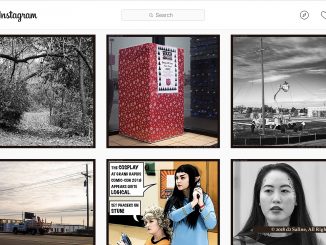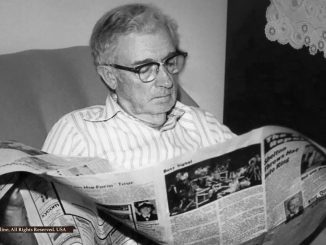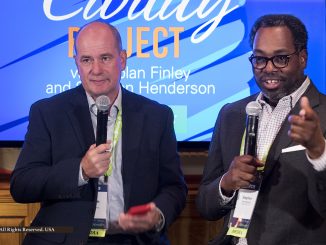
Tomorrow morning, the Ann Arbor / Ypsilanti Regional Chamber will host another Early Edition breakfast from 7:00am to 8:45am at Weber’s Inn. Once again, a distinguished panel will discuss an area of immediate, practical concern. [1,2]
Its title: ” The Loss of Local Media: How to Remain Informed and Engaged.” [3]
Distinguished as its panel promises to be, there’s a lot to be said from the perspective of a “Hometown Newspaper” that made its first appearance here in 1958 (after having established itself over the course of a decade elsewhere). As noted in Part 1 of this two-part interview, Brian Cox began working for The Saline Reporter in 2001. Eighteen years later, he sat down with Saline Journal to talk about what professional community journalism was like before the precipitous decline of traditional print media. [4-7]
Saline Journal: “How might readers recognize a ‘local media’ source that is truly local today?”
Brian Cox: “I think a good way to distinguish ‘local media’ is by its focus.
“We would often get complaints from Milan residents if a ‘Saline’ story ran in the News-Leader; and vice-versa from Saline readers if a ‘Milan’ story ran in The Reporter.
“Readers understood they would get their wider news from other sources (county or state from The Ann Arbor News or The Detroit Free Press; national from The New York Times or USA Today). They wanted news on their community, their kids, their teachers, their mayor, their city council or school board member.
“The other aspect readers sought was, how do events from across the state or nation affect the community: I wrote too many stories on local soldiers returning from war in Iraq. A Milan soldier, Marine Corporal Gary Koehler, was killed on his second tour of duty. I covered his funeral. Saline High School graduate Marine Corporal John Lockwood was gravely injured by an IED. I interviewed him numerous times.
“‘Local media’ is obligated to provide its community with ‘what is happening here’ and with ‘How does what is happening out there affect here?'”
“Here are the headlines from the front page of the March 6, 2008, edition of The Saline Reporter, all under my byline: ‘Local man charged with attempted murder,’ ‘Board interviews supt. candidates,’ ‘Serving proudly: Local grad in Iraq,’ ‘Sharing a message with teens’ (story of a woman talking about her traumatic brain injury to students).
“That gives an idea of the range of stories I covered, and I’m proud of that.
Saline Journal: “In what ways has local journalism changed with the loss of The Saline Reporter in print every Thursday, in favor of virtually real time reporting via Facebook groups?
Brian Cox: “With so many weekly papers having closed in the recent past, local media has changed to small outposts of ‘community journalism,’ which can be great and informative. I think its often different in its objectivity, though.
“When covering city council or school board, I was very conscious of trying to never let any personal opinion filter into my coverage. Community journalists often bring the opposite; it’s almost expected. I think it tends to be more in the style of blogging than reporting.
“I also think the loss of community papers has resulted in neighbors no longer drawing their information about their community from the same well, and, I think, while not necessarily bad, it does mean one less ‘connection’ in people’s lives.
“I also don’t know anyone who prints out an online story about some accomplishment of their kid or grandkid to stick it under a magnet on the refrigerator. I know stories I wrote about people in the community have been cut out and made their way into family scrapbooks. I know and draw great satisfaction from the knowledge that I was documenting the life of a community.”
Saline Journal: “It sometimes seems that the ‘dirty little secret’ behind laments about “loss of professional journalists” are in some part rooted in diminished opportunities “to make a living, if not profit, as a career journalist.”
Brian Cox: “There is something to be said for the loss of journalists who were making their living at the craft.
“That isn’t to say I don’t think a ‘community journalist’ can’t do as good a job. But it is a difficult job to get right even after years of experience, and it is damn difficult to develop the trust of the community if you don’t do it consistently well.
“The risk that is run by increasingly relying on young or inexperienced journalists is that their understandable errors or oversights can erode the community’s trust in the news source.
“That is the ballgame.”
For those who like to experience the history of local media in its original ink-on-paper form, Saline District Library maintains non-circulating issues of The Saline Reporter for public access in its archives. [8]
References:
- Ann Arbor / Ypsilanti Regional Chamber (home page).
- Weber’s Boutique Hotel (home page).
- “A2Y Chamber Event: Early Edition – The Loss of Local Media: How to Remain Informed and Engaged” (September 18, 2019) Ann Arbor / Ypsilanti Regional Chamber.
- “The Saline Reporter” (June 11, 1958) Central Michigan University: Digital Michigan Newspapers.
- “The Reporter” Central Michigan University: Digital Michigan Newspapers.
- “Saline Reporter” Central Michigan University: Digital Michigan Newspapers.
- “Exclusive interview with Brian Cox, former journalist with ‘The Saline Reporter,’ on loss of local media: Part 1” Dell Deaton (September 16, 2019) Saline Journal.
- Saline District Library (home page).



